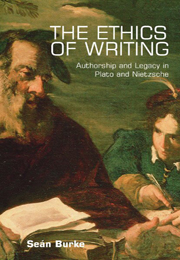Book contents
- Frontmatter
- Contents
- Acknowledgements
- Key to References and Abbreviations
- Prologue: Friedrich Nietzsche in Auschwitz, or the Posthumous Return of the Author
- Introduction: The Responsibilities of the Writer
- Chapter 1 The Ethical Opening
- Chapter 2 The Ethics of Legacy
- Chapter 3 Signature and Authorship in the Phaedrus
- Chapter 4 The Textual Estate: Nietzsche and Authorial Responsibility
- Conclusion: Creativity versus Containment: The Aesthetic Defence
- Bibliography
- Index
Conclusion: Creativity versus Containment: The Aesthetic Defence
Published online by Cambridge University Press: 12 September 2012
- Frontmatter
- Contents
- Acknowledgements
- Key to References and Abbreviations
- Prologue: Friedrich Nietzsche in Auschwitz, or the Posthumous Return of the Author
- Introduction: The Responsibilities of the Writer
- Chapter 1 The Ethical Opening
- Chapter 2 The Ethics of Legacy
- Chapter 3 Signature and Authorship in the Phaedrus
- Chapter 4 The Textual Estate: Nietzsche and Authorial Responsibility
- Conclusion: Creativity versus Containment: The Aesthetic Defence
- Bibliography
- Index
Summary
It is, of course, too late in any case: just as Hegel did not preface his Phenomenology with the words ‘this is all a thought-experiment’, so history will not permit us to read Nietzsche with the codicil: ‘To be read as if spoken by a character in a novel’. But the case of Nietzsche does point towards an ethic of discourse that began to take shape with the formation of the Vienna Circle, the logical positivist movement and which, after Auschwitz and Stalinism has never been far from the thoughts of responsible authors. Hence, the import and purport of the epigraph at the very front of this work.
Uncannily, the Phaedrus foresaw precisely the Nietzschean predicament. Every destinational problematic in the Nietzschean oeuvre (as its fissiparous potential gathered force between the writing of Thus Spoke Zarathustra in 1883 and the completion of the cavalier, bombastic, humorous but profoundly unsettled and unsettling Ecce Homo) is given through the persona of Socrates at 275d-e. Such prescience, we have argued, derives from the fact that dialectic covertly is also in the place of that defenceless writing, that discourse in need of its parent to come to the rescue.
Plato evolved the most succinct (if not, indeed, the most sophisticated) account of discursive ethics that we have as reference, even today. On the other hand, he transgresses the terms of his ethic by the very fact that the Phaedrus is a written work, a work which eo ipso takes its chances with uncertain destination, with unsuitable readings.
- Type
- Chapter
- Information
- The Ethics of WritingAuthorship and Legacy in Plato and Nietzsche, pp. 222 - 233Publisher: Edinburgh University PressPrint publication year: 2008



